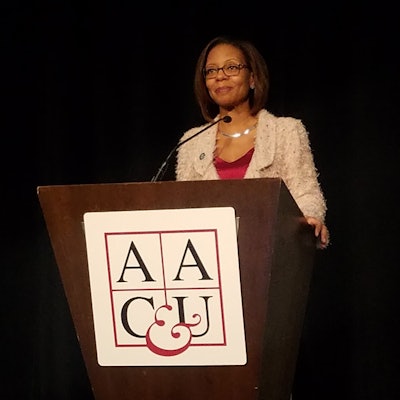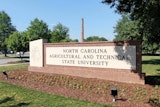The coronavirus pandemic has been a setback for many higher education initiatives. But not so for Project Kaleidoscope, according to Dr. Kelly Mack, its executive director. She thinks the initiative for STEM higher education reform is only getting started — and the unforeseen pause of in-person learning could help the project heighten its offerings for next year.
 Dr. Kelly Mack
Dr. Kelly MackProject Kaleidoscope, or PKAL, is an Association of American Colleges & Universities. (AAC&U) center dedicated to making transformative change in undergraduate STEM education including diversifying the ranks of STEM degree holders. PKAL started in 1986 and joined AAC&U in 2010. It now has a network of more than 7,000 STEM faculty and administrators.
When Mack took the helm in 2012, the center adopted a renewed emphasis on empowering faculty to support underrepresented students in STEM fields. Since then, it more than doubled the number of Black and Latinx STEM faculty who participate in its STEM leadership development program as well as the number of representatives from minority serving institutions.
“It’s not out of a knee-jerk reaction that we feel we have to focus on diversity, equity and inclusion and social justice in STEM,” says Mack. “We have always understood that excellence in undergraduate STEM reform cannot be achieved if we are not paying attention to eradicating the systems and structures embedded in STEM that advantage some and disadvantage others.”
STEM disciplines are notoriously lacking in diversity, with a notable gap between STEM and non-STEM academic fields. Black faculty, for example, made up only 0.7% to 2.9% of professors in biology, chemistry and economics, compared to 8.8% to 15.1% percent of professors in sociology, English and educational leadership and policy, according to a 2017 report by the Brookings Institution, which surveyed 4,000 tenure-track faculty from 40 public institutions.
To help change the status quo, Project Kaleidoscope now focuses on professional development for STEM scholars and leaders. Normally, this summer, Project Kaleidoscope would be hosting the 2020 STEM PKAL Leadership Institute, which gathers early- and mid-career STEM faculty, principal investigators and administrators for training designed to attune them to the disparate privilege and power dynamics within STEM higher education. This year, the convention and all in-person institutes were cancelled to keep participants and facilitators safe, in part because of the center’s focus on experiential learning techniques.
“All of our programs — but especially our leadership development institute — are very hands-on and very high-touch,” Mack says. “… We don’t just sit in our chairs and listen to experts talk, but we are seated face-to-face, eye-to-eye and heart-to-heart in ways that are most conducive for interacting, for learning and for engaging in the most difficult of conversations, as well.”
While Mack feels the leadership institute experience can’t be fully replicated online, she also sees this moment as an opportunity to revamp the center’s programs. For example, the project has been engaging with program developers to discuss what virtual adaptations of these gatherings could look like. Her hope, however, is to be able to continue the institutes in person next year — but as an improved version, the result of an extra year of work and deliberation.
“This is a rare circumstance, and we’ve made every effort to ensure we are better because of it,” she says. “We are going back and re-engineering some of our professional development offerings. I’m confident we’ll be positioned to provide our STEM faculty colleagues with the kind of information and experiences that will be vital to their leadership success.”
Next year, the program will be even more grounded in experiential learning theory with “more powerful” professional development tools and an increased focus on “creating the kinds of authentic interactions and situations that are indicative of real lived experiences of STEM faculty, particularly Black STEM faculty and our STEM faculty and colleagues from the LGBTQ community and other races and ethnicities,” she added.
The goal of the leadership institute is to try and get STEM faculty and administrators to deeply reflect on the experiences of their coworkers from underrepresented backgrounds, informing their leadership approach going forward. For the last four years, the Kaleidoscope Project has been using a tool called My Tenure Trek®. It’s a professional development exercise that simulates the obstacles different STEM faculty can face over the course of their tenure process based on their different identities.
Those obstacles are reflected in the numbers. Across higher education, the percentage of minority professors is less among tenured faculty than junior faculty. Last year, a Pew research study found that in fall 2017, 27% of assistant professors were people of color compared to 19% of fully tenured professors.
As a part of My Tenure Trek®, participants are asked to select a different identity than their own — in terms of gender, sexual orientation, race and/or ethnicity — and the exercise helps them experience the tenure track through that lens.
“It’s an opportunity for our participants — and even our invited mentors and coaches and our staff — to really grapple with the lived experiences of colleagues who are of a different race, gender, or sexual orientation than them and find ways to heighten their levels of awareness for different perspectives and worldviews, while deepening their levels of empathy,” Mack says.
For facilitators from minority backgrounds, it isn’t always easy. It often involves unearthing their own “moments of trauma” along the tenure track in STEM disciplines, she added, but it’s also “powerful” to know they’re helping tenure-track scholars through their own experiences.
The program is predicated on the idea that STEM field leaders need to embrace self-reflection and empathy as core values in order to reform undergraduate STEM programs and foster faculty diversity.
Too often, STEM higher education reform takes the form of a to-do list, Mack says, or a list of dos and don’ts for diverse faculty retention without dealing with the underlying power dynamics at play.
Because every higher education institution is different, there’s no “magical list” of reforms that’s going to work for all of them, Mack says, so the goal of Project Kaleidoscope’s institutes isn’t to send scientists back to their campuses with a specific set of policies and procedures to tackle. It’s to make sure administrators in STEM departments lead from a place of understanding, where they know the power of their privilege and can empathize with the diverse experiences of colleagues and students. For that reason, the project’s slogan is “lead differently.”
“Our participants are able to reflect on themselves critically, then make different kinds of decisions as leaders,” she says. “The kinds of decisions that create the conditions whereby everyone flourishes in the environment, not just a chosen few. The kinds of decisions that push hard against systems and structures of oppression in undergraduate STEM culture, no matter how unpopular the decisions might be.”
This article originally appeared in the July 23, 2020 edition of Diverse. You can find it here.















